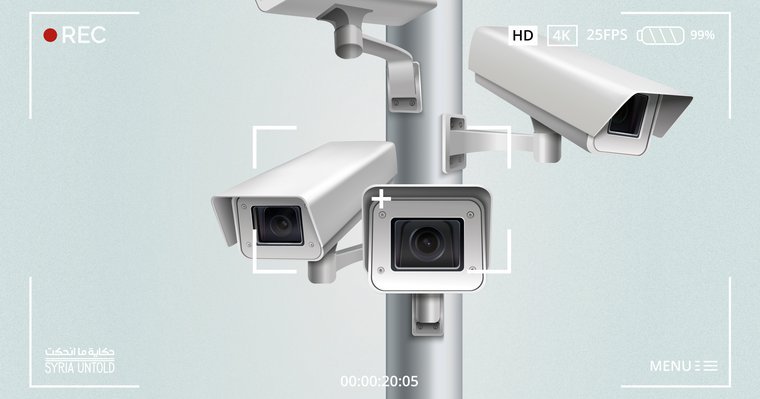
But while traditional forms of censorship may have eased up a little, others have appeared. Among those is religious and sectarian censorship—or perhaps that was also an attempt by minorities to benefit from the regime flirting with the alliance of minorities. Najdat Anzour’s latest film “Palm Tree Blood” (Dam Annakheel) found itself caught up in censorship by the Druze sect, simply for having presented a character speaking a Druze accent as a coward. This forced the filmmakers, in perhaps the only precedent in the history of Syrian cinema, to halt commercial screenings, apologise and later remove the scene altogether.
Cinematic commandments
We might say that the new cinema (mainly in documentary form) freed itself completely from regime oppression, and no longer worries about the regime’s standards of censorship. However, it is still difficult to deny the emergence of new forms of censorship in certain areas, which had its clear affect in the absence of filmmaking and other art forms. Or perhaps it merely impeded its production cycle.
Within the realms of the NFO, we can speak of creative forms of tricking censorship committees—as Omar Amiralay did with “A Flood in Ba’ath Country” by presenting the NFO with a dummy scenario about ancient ruins in order to shoot a different kind of film. Whereas nowadays, Talal Derki, director of “Of Fathers and Sons” (Aba’a w Abna’a, 2017), also had to make use of trickery—not against censorship committees this time, but against hardline Islamists in rural Idlib. Derki presented himself as a friend of the jihadists, until the moment he was able to finish his film. And we must note here, that among the results of the film screening (along the Oscar nomination) was a wide wave of dismay and criticism for having portrayed Idlib as a hotbed for Islamists, portraying the Syrian revolution as terrorism, while overlooking the regime as the reason behind the catastrophe. Such reactions may be considered an early lesson in the censorship that filmmakers of the new cinema might want to avoid to avert accusations of treachery. More so perhaps because some have created semi-rules or commandments, so that film directors must supposedly relate every theme they address in their films with the regime as the main source of all their disasters.
Perhaps that is what director Firas Fayyad referred to as the remnants of regime censorship in everyone. Fayyad said that: “An entire generation of artists was raised under this censorship and fear. It’s not easy to shed it all off,” adding that, “despite being the revolutionary belonging to the uprising for change and freedom, the artist cannot give away with the residue easily. He will at least bear in mind this or that group that would applaud for and support him.”
He doesn’t end there. Fayyad then clarified that acquiescing to funders’ agendas—funders who just want to focus on terrorism alone, or condemn one side and not the other—is also problematic. The maker of “Last Men in Aleppo” (Akher Arrijal f Halab, 2017) spoke of how a German jury member objected to his referral to Russia, while he presented a new film project, in saying that “this reveals why the Berlinale avoids any criticism of Russia.” Fayyad is saying that Russia is not only able to influence elections here and wars there, but also cinematic agendas as well.
Fayyad also noted two other forms of censorship follow the release of a film. He spoke of the power of journalism in a country like Turkey, where he lived and worked in recent years, to influence attendance of the audience of a certain film, for example. “Even though Turkey supports the Syrian revolution, they attempt to steer towards a sectarian interpretation of what’s happening,” he said, adding that “newspapers of the political left have considered that my film ‘Last Men in Aleppo’ supports terrorism. This affects you personally as an artist, and may prohibit you from achieving your next film.” Apparently, if you are categorised as such, no one will cooperate with you next time.
Fayyad’s film was repeatedly banned from screening in numerous Arab countries. “In Lebanon they refused to screen it, even though the funding institution, the Arab Fund for Arts and Culture (AFAC), is based in Lebanon, and screened many other films. Perhaps because those responsible did not delve deeper in to the Syrian situation, but addressed only the themes of Sunni terrorism, refugees and migrant labor.” In Algeria, they clearly said they “cannot screen the film because it will trigger a diplomatic crisis with Syria.” Neither was the film screened in countries like Jordan, Egypt, Morocco or even Qatar, despite the latter having screened less important, but pro-revolution, films beforehand, according to the director. It was not screened in Saudi Arabia either, although the film supposedly does not contradict its political vision or it’s cinematic norms and boundaries.
Cinema director Ammar al-Beik also says that yielding to funders’ agendas is what turned many Syrian projects into reportages rather than films. He wonders: “Is there a TV station that screened films that do not comply with its politics?” Adding that, “there is huge failure in trailing behind global media demands,” whereby, “funders give you money because they expect footage of the war.”
PrintRachid Issa | Radio Free (2020-02-03T23:00:00+00:00) New Cinema in Syria: The revolution continues, but so does censorship. Retrieved from https://www.radiofree.org/2020/02/03/new-cinema-in-syria-the-revolution-continues-but-so-does-censorship/
Please log in to upload a file.
There are no updates yet.
Click the Upload button above to add an update.